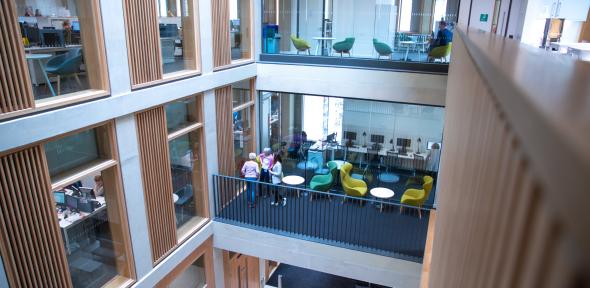
The University’s senior leadership team has set a target to reduce gas use by 15% over the course of the current financial year (2022/23).
The following message has been sent to all University-employed staff by Professor Kamal Munir, Pro-Vice-Chancellor for University Community and Engagement.
Like so many institutions and households across the country, the University is facing an unprecedented rise in energy costs. These are projected to increase from around £22m in 2021/22, to almost £41m in 2022/23, and to £78m in the year after that.
We want to reduce our overall carbon emissions, and you can find out more about our commitment to do so. We also want to reduce the amount we spend on gas and electricity. The more the University spends on energy, the less it has available to support its teaching and research.
As a result, we must take urgent action to reduce energy consumption in University buildings – not just this winter but beyond, and we need your help to do that.
Short-term steps
The University’s senior leadership team has set a target to reduce gas use by 15% over the course of the current financial year (2022/23).
To achieve this, we plan to take the following four steps:
- Heat University buildings from 1 October to 31 March only
- Reduce the thermostat temperature of buildings to 19°C
- Heat buildings on weekdays only, and during core working hours
- Turn heating off in spaces that are not in use.
With support from across the University to implement these four measures, we believe we can save around 3,400 tonnes of carbon - a 7% reduction on our total energy-related emissions in 2021/22.
Long-term plans
As well as taking urgent steps to reduce our energy consumption this winter, we also need to reduce gas and electricity use over the longer term. The University has adopted Science Based Targets for carbon reduction, committing itself to reduce its energy-related carbon emissions to absolute zero by 2048.
The Estates Division is already working with institutions across the University on a number of vital initiatives, including:
Investing in energy efficiency projects and improvements through the University’s Carbon Reduction Fund and Equipment Replacement Programme
- Developing a programme of thermal efficiency improvements across the University estate
- Reducing our dependency on gas by moving towards renewable heating systems across the estate
- Making more efficient use of our existing spaces
- Identifying under-utilised buildings where heating and services could be turned down, or off altogether.
How you can help
We need your help to meet our target of reducing our gas consumption by 15% this financial year.
Please help us by:
- Supporting the four short-term steps outlined above, and encouraging your colleagues and students to do the same
- Encouraging your department (and if you have them, labs) to get involved in Green Impact and/or LEAF, which provides frameworks for the practical steps that staff and students can take to reduce their energy use and wider environmental impact – and be recognised for this
- Identifying additional steps that your department or institution could take to reduce its energy use. The Sustainability Team can provide advice on how you can go about this, and how you can apply for the University’s Carbon Reduction Fund, which supports carbon reduction initiatives across the Estate.
- Reporting any faults in University-managed buildings that are leading to excessive use or waste of energy. Contact the Estates helpdesk on efhelpdesk@admin.cam.ac.uk, or call 01223 (3)37784 (open 24 hours).
We recognise, of course, that domestic heating costs are also rising rapidly, and that many staff and students will appreciate having somewhere warm to work from over the coming months. While we must try to reduce our costs, we will be striving to provide enough warm spaces for our staff and students this winter where they can work or meet.
Thank you in advance for your support.
